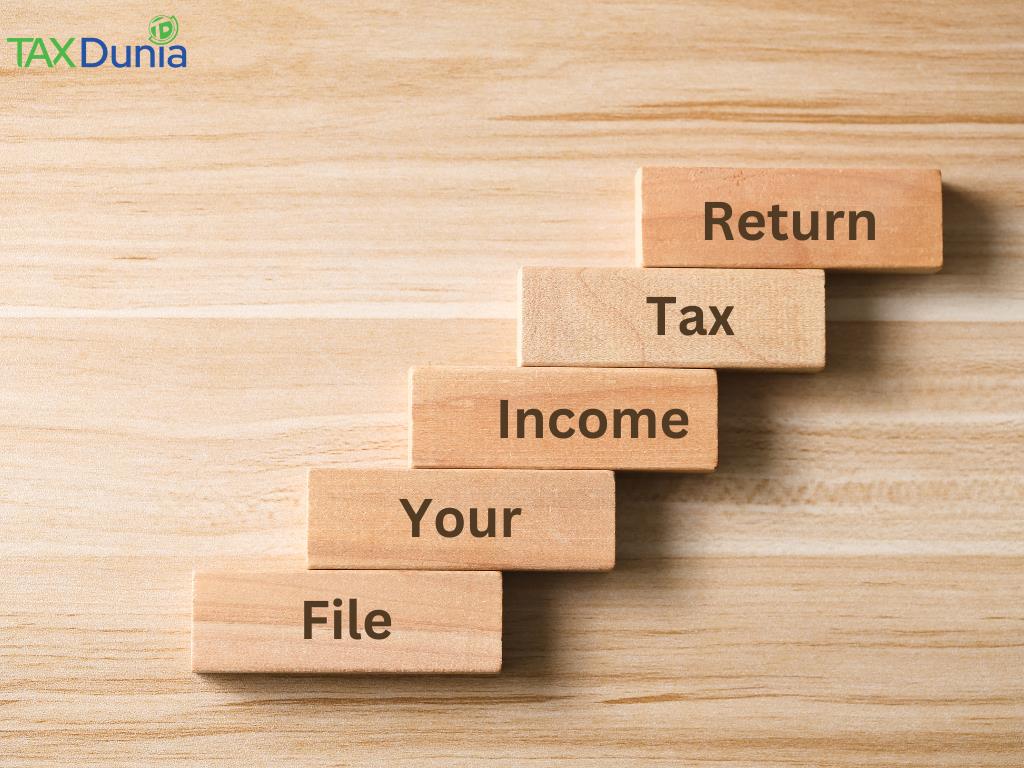The Income Tax Act 1961 enables individuals, companies, or others to pay income tax. The total income tax is calculated based on taxpayers’ annual income. Those who have an annual income less than the basic exemption limit are not mandated by the law to file returns. However, those who have an annual income higher than the basic exemption limit are liable to pay taxes. ITR filing becomes a must when it comes to reporting income, expenses, tax deductions, investments, etc. The filing requires so much precision and a lot of attention, as income from all the possible heads is to be reported. Therefore, to save your time and resources, reaching out to a tax professional is a prudent decision.
Guide to Filing Your Income Tax Return
- Go to the Income Tax e-filing portal and log in with valid credentials. Click on the “e-file” menu and select Income Tax Return to begin the filing process.
- Once you are redirected to the income tax page, your PAN details will pop up on the screen, and you are to provide details such as assessment year, ITR form number, filing type, and submission (online or offline).
- Continue to proceed further, and now comes the time to select taxpayer status. For example, whether you are an Individual, a Hindu Undivided Family (HUF), or a Firm/LLP.
- As per the taxpayer’s status, it is time to select the right ITR form among all the existing ones (ITR1, ITR 2, ITR 3 so etc).
- As per the selection, ITR form, fill up the income-related information such as (these details differ based on the ITR form)
-
- PAN, Aadhar number, contact details, and bank account number
- Gross total income, total deductions as per section 80C, 80D, 80TTB, and more
- Any payment of TDS, TCS, advance tax, or self-assessment tax
- Once the income-related information is submitted, proceed with the validation and move on to the verification step. You can verify the form either by generating EVC through your bank account, OTP through Aadhaar card, a pre-validated bank account, or a demat account.
- Submit the ITR, and after the successful submission, you will receive an income tax acknowledgement number either on your registered email ID or mobile number.
What Documents are Important for ITR?
Though the different documents are required to file your income tax returns, as they depend on the sources of income, these common documents are a must for filing
- PAN Card
- Aadhar Card
- Form 16A (for salaried persons)
- Form 26AS (to show TDS, advance tax, and self-assessment tax paid)
- Bank account details
- Investment proofs (LIC, mutual funds, shares, medical insurance, etc)
- Home loan statement (to claim deductions on principal and interest paid)
- Capital gains statement if you sold shares, property, or more
- Rental income details
- Business or profession-related documents
- Interest certificates from banks/post office
| Category | Required Documents |
| Identity | PAN Card, Aadhaar Card |
| Salary Income | Form 16, Salary Slips, Rent Receipts (if HRA claimed) |
| Tax Summary | Form 26AS, AIS & TIS |
| Interest Income | Interest certificates from banks/post office |
| Dividend Income | Demat statements, AIS summary |
| Capital Gains | Broker statement, property sale/purchase deeds |
| Rental Income | Rent agreement, property tax receipts, and loan interest certificate |
| Freelance/Other Income | Invoices, bank statements, and income summary |
| Deduction (Old Regime) | Investment proofs (LIC, PPF, etc.), medical insurance, and donation receipts |
| Bank Details | A passbook or bank statement for the refund account info |
Why You Must File Your Income Tax Return?
You cannot complete the loan application smoothly without filing your ITR. It makes individuals eligible to avail of loans, as financial institutions consider it as evidence of income, financial stability, and represents your financial wellbeing, allowing you access to easy loans.
If you have incurred losses in the current or previous financial years and want them to carry forward, it is crucial File your ITR before the due date to be eligible for carrying forward the losses. Delayed ITR filings do not make you eligible to carry forward losses.
When you deal with such sellers who are liable to deduct TDS or collect TDS and advance tax, you must file an ITR. As you have paid advance tax to the authorities, but the total tax liability by the end of the financial year is lower than the advance tax, you are eligible to claim refunds. ITR status of taxpayers is required when they claim refunds.
Get Started with TaxDunia
You must file the ITR by the 31st of July of the assessment year, though authorities sometimes extend the due dates to encourage more to file the returns. A professional still advises filing it before the due date so that you can avoid the late fees and other penalties as well. Get started with TaxDunia to ensure a smooth compliance.

